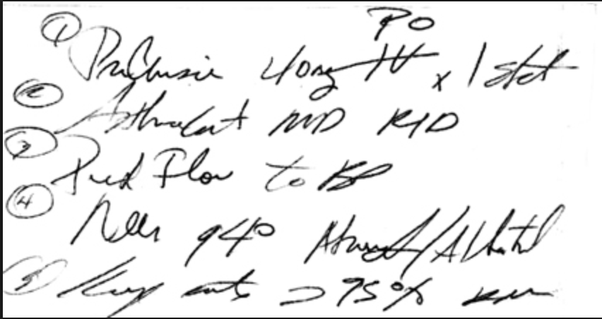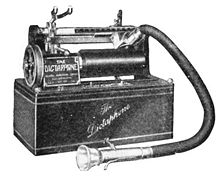 One reason why society is moving to electronic script is to minimize liabilities. Indecipherable cursive, such as the medical prescription pictured at left, can have deadly consequences. Most prescriptions are generated through software today but in 2015, at the height of handwritten medical information, the Institute of Medicine found that 7,000 American deaths could be linked to misreading scrawled and poorly shaped letters on prescriptions. In addition, a study by Bic company as recently as 2018, found that 50% of Americans have been told that their handwriting is hard to read and 45% have trouble reading their own cursive! Those high rates of illegible handwriting also cause everyday miscommunications in the workplace when fellow employees misread or cannot read handwritten directions. As longhand loses its usefulness and digital or AI replacements remove the liabilities it creates we could see its gradual disappearance as early as this decade.
One reason why society is moving to electronic script is to minimize liabilities. Indecipherable cursive, such as the medical prescription pictured at left, can have deadly consequences. Most prescriptions are generated through software today but in 2015, at the height of handwritten medical information, the Institute of Medicine found that 7,000 American deaths could be linked to misreading scrawled and poorly shaped letters on prescriptions. In addition, a study by Bic company as recently as 2018, found that 50% of Americans have been told that their handwriting is hard to read and 45% have trouble reading their own cursive! Those high rates of illegible handwriting also cause everyday miscommunications in the workplace when fellow employees misread or cannot read handwritten directions. As longhand loses its usefulness and digital or AI replacements remove the liabilities it creates we could see its gradual disappearance as early as this decade.
Signatures will vanish first. They already have, in fact. There's no need to sign credit charges anymore and I don't remember the last time I was asked to scrawl my signature on a point of sale screen in a retail store or doctor's office. It's legal for me to write X or draw a picture anyway and that's an improvement over the wavy mess those point of sale devices create. I think the last signature required of me was for my voter's ballot. Signatures on ballots are meant to safeguard from fraud but in practice they are the number one reason a ballot can be disqualified. Last year in Bay Area California alone 160,000 ballots were thrown out because the signatures didn't seem to match the original registration. That's a Civic liability. We'll always have some way to identify ourselves but signatures are falling out of favor and technologies like chips, pins, and passwords will evolve toward iris identification and fingerprints which are more unique and consistent ways to validate who we are. So, lets bid farewell to "John Hancocks" and "John Henrys" they're going the way of quills and inkwells soon.
After signatures fade cursive may slip away entirely. In fact, society is already moving in that direction. For several years schools haven't taught cursive. Consequently there are young Americans today that print but can't read or write script. Whether or not to include cursive in core curriculum is currently a hot subject that's centered regionally in Southern states that are reinstating mandatory cursive exercises. The reason? Cursive, they say, is an American Tradition. Do we revive cursive or let it fade let it fade away? Some pediatricians are issuing concern about losing the developmental skills that cursive encourages while still others contend that printing serves a similar developmental function. Some argue that it doesn't matter so much if a generation can't read script yet others worry that the loss of handwriting skills means that access to our handwritten historical record will be effectively lost. What do you think?
 Society is moving away from handwriting gradually as our platforms for communication expand. According to Time magazine we've been slipping away from cursive since 1935! Back then public figures who downgraded the need for good penmanship were to blame. Advances in communication technology, such as the dictaphone (pictured left) and typewriter always raised concern that handwriting would disappear. Yet today longhand faces a unique confluence of events pushing it out of our lives. It was removed from core educational curriculum 7 years ago while at the same time email, texting, tweeting, whatsapp and so many other communication formats began competing with script and transforming our sense of messaging. I notice that my patience for a 3 page letter isn't what it used be. How about you? Shorter and shorter digital notes have changed my expectations and attention span. Take a minute to ask yourself: when did I last receive a handwritten letter? Do I create digital documents more than written text? Do I use handwriting at work or when I volunteer? Have I ever struggled to read my own handwritten shopping list? Do I use a smartphone to keep reminders or short notes? Do I ask my AI to remember things for me that I may have written down before? Through the majority of our lives cursive was the dominant formal way to create text but if you're like me you see the signs of significant change in your own life.
Society is moving away from handwriting gradually as our platforms for communication expand. According to Time magazine we've been slipping away from cursive since 1935! Back then public figures who downgraded the need for good penmanship were to blame. Advances in communication technology, such as the dictaphone (pictured left) and typewriter always raised concern that handwriting would disappear. Yet today longhand faces a unique confluence of events pushing it out of our lives. It was removed from core educational curriculum 7 years ago while at the same time email, texting, tweeting, whatsapp and so many other communication formats began competing with script and transforming our sense of messaging. I notice that my patience for a 3 page letter isn't what it used be. How about you? Shorter and shorter digital notes have changed my expectations and attention span. Take a minute to ask yourself: when did I last receive a handwritten letter? Do I create digital documents more than written text? Do I use handwriting at work or when I volunteer? Have I ever struggled to read my own handwritten shopping list? Do I use a smartphone to keep reminders or short notes? Do I ask my AI to remember things for me that I may have written down before? Through the majority of our lives cursive was the dominant formal way to create text but if you're like me you see the signs of significant change in your own life.
Don't get me wrong. I love handwriting. It will continue to live on in my life and I'll hate to see it go. Yet I believe that competition from other communication mediums, the advent of AI, and preferences of the digital generations behind us will hasten its end. I trust that whatever comes after it will be superior just as script was a unique improvement over printing. I know that society will be better off without the miscommunications caused by bad handwriting and that we're safer with software generated medical prescriptions. As we age handwriting often gets too bad to use anyway and we find other ways to communicate. I'm thankful that there are easier alternatives. I trust that successive generations will create new traditions and new ways to communicate uniquely. Cursive may disappear from mainstream this decade and handwriting may be next but our urge to communicate and our ability to identify uniquely will always endure.

